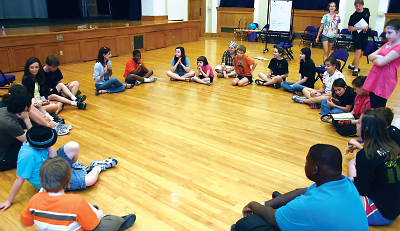Recent evidence suggests that techniques commonly used by actors may help engage patients in new ways.
“Acting requires being social, spontaneous, and flexible, which are exactly the behaviors that are often deficient in mental illness,” Blythe Corbett, Ph.D., an associate professor of psychiatry and psychology at Vanderbilt University, told Psychiatric News.
Corbett, who also has a background in acting, thought these traits might be particularly helpful for engaging children with autism spectrum disorder (ASD), so several years ago she began recruiting middle- and high-school theater students to participate in a theater-based therapy program for similarly aged youth with ASD.
The program is known as the SENSE Theatre and is an outgrowth of Corbett’s research group, the Social Emotional NeuroScience Endocrinology (SENSE) lab.
Over the course of two or 10 weeks (for winter and summer programs), children with ASD and their actor peers are tasked with putting on a short play in which all the children have parts. In addition to helping plan the production, the children engage in various theater games to learn about role-playing and improv during the course of the program.
“But while on the surface the children are put in a play and cast in a role, they also learn a lot about themselves, in a subtle way,” Corbett said.
“And just seeing some amazing stage performances from children who began the program in a complete shell would be enough to consider SENSE Theatre a rousing success,” she continued.
“I don’t know how many times a parent has come up to me after a performance and said, ‘I could not believe my child could do that,’” echoed Catherine Coke, who directs high school theater at the University School of Nashville, which partners with Corbett’s program. “I’ll never forget the child who refused to accept a certificate of completion because the child did not want the program to end.”
Recent trials by Corbett’s group suggest the program may also have a lasting impact on the social abilities of the participants.
In a study published in the Journal of Autism and Developmental Disorders, Corbett and colleagues described how they randomly assigned 30 children with ASD aged 8 to 14 to participate in a 10-week, 40-hour theater-based program or be placed on a wait list.
After the program ended, the children who had enrolled showed significant improvements in social communication, group play, and face recollection compared with the controls. Participants who participated in the program also showed more group play with children outside the treatment setting, as well as improvements at home, which remained evident at a two-month follow-up.
Acting Exercises Build Trust in Group Therapy
Patients with autism are likely not the only ones who might benefit from acting. Miguel Alampay, M.D., J.D., has been exploring the use of improv for adults dealing with posttraumatic stress disorder as well as other mental issues.
“In the third year of my psychiatry training [at Walter Reed National Military Medical Center in Bethesda, Maryland], I was required to do a therapy group, and I got to thinking about barriers to care,” he told Psychiatric News. “What prevents people from being forthcoming during a session, or from coming at all? And the answer was trust.”
To break those trust barriers, Alampay developed a 12-week group therapy called Improv Life, which incorporates improvisation and role-playing games during the first half of each session prior to the formal discussion.
“What’s nice about improv is that it’s based on the principle of ‘Yes, and?’ ” Alampay said. “In normal life, we are so used to hearing ‘Yes, but. ...’ However, the goal of improv is to take whatever is said to you and go with it, which keeps conversations going and helps someone open up.”
He noted that the acting component of the program can be particularly therapeutic for participants who are active or retired military personnel. (Alamapy said he asks military personnel to remove any visible signs of their rank to encourage more participation.)
“In taking on a different role, they are able to adopt thoughts and emotions they could not display before,” Alampay said.
Alampay said he has been very pleased with the results of his Improv Life groups (he’s carried out two programs with 30 people total) and learned how to respond when negative behaviors emerge when participants practice role play, improvisation, and humor.
“It can be a fine line between a positive and negative coping mechanism,” he said. “If patients are telling jokes to reinforce negative thoughts about themselves, you might be reinforcing their stigma if you go along with it. One has to be ready to anticipate these pitfalls and guide patients back to a positive frame of mind.”
Patients Aren’t Only Beneficiaries of Sessions
Integrating acting techniques into therapy does more than benefit the patients, Alampay and Corbett agreed. As Alampay prepares for the next phase of his career as the Strike Group Psychiatrist for Expeditionary Strike Group Seven (which includes over 6500 sailors and marines permanently forward deployed in the South China Sea), he said that he is grateful for all Improv Life has taught him.
“In my new role, I won’t be conducting therapy, but rather I’ll be out in the field with the Marines where I have to relate to them and get them to talk to me, to identify potential mental issues early on. And all the improv I did during my group sessions will be a huge boost.”
Corbett likewise has seen how the SENSE Theatre has impacted the youth who help mentor their ASD peers.
“Not only do they all have a greater appreciation and empathy for the disorder, which is critical during the school-age years, but we’ve even had a few students who have become interested in mental health as a possible profession,” she said. ■
An abstract of “Improvement in Social Competence Using a Randomized Trial of a Theatre Intervention for Children With Autism Spectrum Disorder” can be accessed
here.




